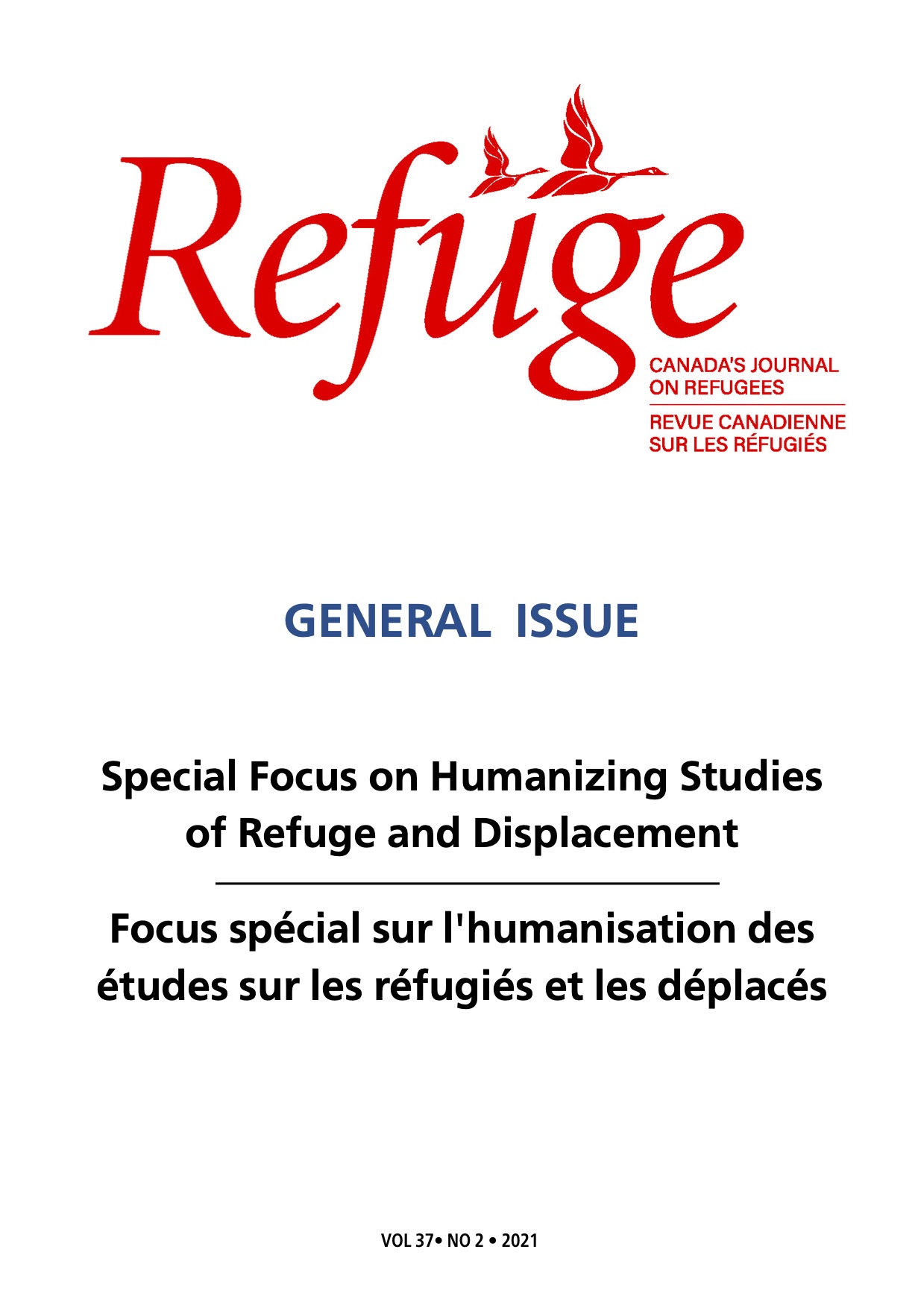Humanizing Studies of Refuge and Displacement: Considering Complicity, Contingency and Compromise
DOI:
https://doi.org/10.25071/1920-7336.40971Keywords:
humanizing refugee studies, critical refugee scholarship, forced migrationMetrics
References
Agamben, G. (1998). Homo sacer: Sovereign power and bare life (D. H. Roazen, Trans.). Stanford University Press.
Bakewell, O. (2008). Research beyond the categories: The importance of policy irrelevant research into forced migration. Journal of Refugee Studies, 21(4), 432–53. https://doi.org/10.1093/jrs/fen042
Black, R. (2001). Fifty years of refugee studies: From theory to policy. International Migration Review, 35(1), 57–78. https://doi.org/10.1111/j.1747-7379.2001.tb00004.x
Bloch, A. (2020). Reflections and directions for research in refugee studies. Ethnic and Racial Studies, 43(3), 436–459. https://doi.org/10.1080/01419870.2020.1677928
Chimni, B. S. (1998). The geopolitics of refugee studies: A view from the South. Journal of Refugee Studies, 11(4), 350–374. https://doi.org/10.1093/jrs/11.4.350-a
Chimni, B. S. (2009). The birth of a “discipline”: From refugee to forced migration studies. Journal of Refugee Studies, 22(1), 11–29. https://doi.org/10.1093/jrs/fen051
Dauvergne, C. (2005). Humanitarianism, identity, and nation: Migration laws in Canada and Australia. UBC Press.
Fassin, D. (2012). Humanitarian reason: A moral history of the present (R. Gomme, Trans.). University of California Press. (Original work published 2010)
Getachew, A. (2019). Worldmaking after empire: The rise and fall of self-determination. Princeton University Press.
Grahl-Madsen, A. (1983). Identifying the world’s refugees. Annals of the American Academy of Political and Social Science, 467(1), 11–23. https://doi.org/10.1177/0002716283467001002
Harrell-Bond, B. (1986). Imposing aid: Emergency assistance to refugees. Oxford University Press.
Harrell-Bond, B. (2002). Can humanitarian work with refugees be humane? Human Rights Quarterly, 24(1), 51–85. https://doi.org/10.1353/hrq.2002.0011
Ibeanu, O. (1990). Apartheid, destabilization and displacement: The dynamics of the refugee crisis in Southern Africa. Journal of Refugee Studies, 3(1), 47–63. https://doi.org/10.1093/jrs/3.1.47
Jacobsen, K., & Landau, L. B. (2003). The dual imperative in refugee research: Some methodological and ethical considerations in social science research on forced migration. Disasters, 27(3), 185–206. https://doi.org/10.1111/1467-7717.00228
Kapoor, I. (2005). Participatory development, complicity and desire. Third World Quarterly, 26(8), 1203–1220. https://doi.org/10.1080/01436590500336849
Kushner, T. (2006). Remembering refugees: Then and now. Manchester University Press.
Landau, L. B. (2012). Communities of knowledge or tyrannies of partnership: Reflections on north–south research networks and the dual imperative. Journal of Refugee Studies, 25(4), 555–570. https://doi.org/10.1093/jrs/fes005
Leach, M. (2003). “Disturbing practices”: Dehumanizing asylum seekers in the refugee “crisis” in Australia, 2001–2002. Refuge: Canada’s Journal on Refugees, 21(3), 25–33. https://doi.org/10.25071/1920-7336.21301
Malkki, L. H. (1995). Refugees and exile: From “refugee studies” to the national order of things. Annual Review of Anthropology, 24(1), 495–523. https://doi.org/10.1146/annurev.an.24.100195.002431
Marfleet, P. (2007). Refugees and history: Why we must address the past. Refugee Studies Quarterly, 26(3), 136–148. https://doi.org/10.1093/rsq/hdi0248
Marin, L. 1991. Frontiers of utopia: Past and present. Critical Inquiry, 19, 397–420. http://www.jstor.org/stable/1343958
McGrath, S., & Young, J. E. E. (Eds.). (2019). Mobilizing global knowledge: Refugee research in an age of displacement. University of Calgary Press.
Robinson, V. (1990). Into the next millennium: An agenda for refugee studies. A report on the first annual meeting of the International Advisory Panel, January 1990. Journal of Refugee Studies, 3(1), 3–15. https://doi.org/10.1093/jrs/3.1.3
Scallettaris, G. (2007). Refugee studies and the international refugee regime: A reflection on a desirable separation. Refugee Survey Quarterly, 26(3), 36–50. https://doi.org/10.1093/rsq/hdi0241
Sithole, T. (2020). The Black register. Polity Press.
Smith, D. L. (2020). On inhumanity: Dehumanization and how to resist it. Oxford University Press.
Stein, B. N., & Tomasi, S. M. (1981). Foreword. International Migration Review, 15(1/2), 5–7. https://doi.org/10.2307/2545317
Terpstra, N. (2015). Religious refugees in the early modern world: An alternative history of the Reformation. Cambridge University Press.
Turton, D. (1996). Migrants & refugees. In T. Allen (Ed.), In search of cool ground: War, flight and homecoming in northeast Africa (pp. 96–110). Africa World Press, Inc.
Weheliye, A. G. (2014). Habeas viscus: Racializing assemblages, biopolitics, and Black feminist theories of the human. Duke University Press.
Zetter, R. (1988). Refugees and refugee studies : A label and an agenda. Journal of Refugee Studies, 1(1), 1–6. https://doi.org/10.1093/jrs/1.1.1
Zetter, R. (1991). Labelling refugees: Forming and transforming a bureaucratic identity. Journal of Refugee Studies, 4(1), 39–62. https://doi.org/10.1093/jrs/4.1.39
Zetter, R. (2007). More labels, fewer refugees: Remaking the refugee label in an era of globalization. Journal of Refugee Studies, 20(2), 172–192. https://doi.org/10.1093/jrs/fem011
Downloads
Published
Versions
- 2021-11-22 (3)
- 2021-12-30 (2)
- 2021-11-22 (1)
How to Cite
Issue
Section
License
Copyright (c) 2021 Christopher G. Anderson

This work is licensed under a Creative Commons Attribution-NonCommercial 4.0 International License.
Refuge authors retain the copyright over their work, and license it to the general public under the Creative Commons Attribution-Non Commercial License International (CC BY-NC 4.0). This license allows for non-commercial use, reproduction and adaption of the material in any medium or format, with proper attribution. For general information on Creative Commons licences, visit the Creative Commons site. For the CC BY-NC 4.0 license, review the human readable summary.







